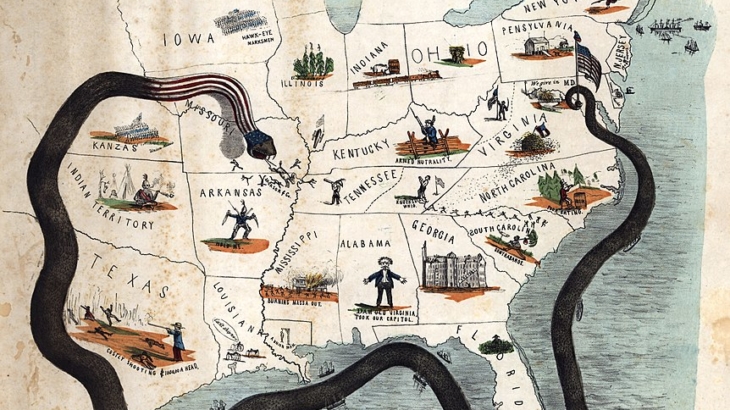July 4, 1863: Vicksburg Surrenders, Completing the Anaconda Plan to Encircle the South
The Anaconda Plan of the Civil War, crafted by U.S. General-in-Chief Winfield Scott, was designed to split and defeat the Confederacy by closing in on the coasts east and south, control the Mississippi River, then attack from all sides. Union Major General Ulysses S. Grant pressed through to take Vicksburg, Mississippi, get the final Confederate strongholds and control the Mississippi River. President Abraham Lincoln believed taking Vicksburg was the key to victory. The Battle at Vicksburg would be the longest military campaign of the Civil War. Vicksburg was surrendered on July 4, 1863.
President Lincoln said of Vicksburg, “See what a lot of land these fellows hold, of which Vicksburg is the key! The war can never be brought to a close until that key is in our pocket. We can take all the northern ports of the Confederacy, and they can defy us from Vicksburg.” Lincoln well summarized the importance of Vicksburg, Mississippi, with both the Union and Confederacy determined to control the city. Along the Mississippi River, Vicksburg was one of the main strongholds remaining for the Confederacy. If the Union could capture this stronghold, it would cut off Confederacy states west of the Mississippi from those east of the Mississippi.
The location was ideal for defending, protected on the north by swamps of the bayou and was located on high bluffs that were along the river, and was given the name, the “Gibraltar of the South.”
General Grant developed a plan. After assuming command of the Union forces near Vicksburg on January 30, 1863, the Union having waged a campaign to take Vicksburg since the spring of 1862, he had been part of an initial failed attempt to take the city in the winter. In the spring of 1863, he tried again. This time, given the location of Vicksburg, he took the bold approach of marching south on the west side of the Mississippi River, then crossing over south of the city. He led troops south 30 miles south of Vicksburg, crossing over at Bruinsburg via Union fleet.
Once landed east of the river, he began to head northeast. On May 2, his troops took Port Gibson, with his troops abandoning supply lines and sustaining themselves from the surrounding countryside. Grant arrived in Vicksburg on May 18, where Confederate General John Pemberton was waiting with his 30,000 troops. Upon arrival, two major assaults on May 19 and 22 by the Union forces failed. Grant regrouped and his troops dug trenches, enclosing Pemberton and his troops.
Pemberton was boxed in with little provisions and diminishing ammunition. Many Confederate soldiers became sick and were hospitalized. In late June, Union troops dug mines underneath the Confederate troops and, on June 25, detonated the explosives. On July 3, Pemberton sent a note to Grant suggesting peace. Grant responded that only unconditional surrender would suffice. Pemberton formally surrendered on July 4. The nearly 30,000 troops were paroled, Grant not wanting to have to address the soldiers. The Union won at Port Hudson five days later.
Lincoln, who had noted how important Vicksburg was to the Union and the war, upon hearing of the surrender, stated, “The father of the waters goes unvexed to the sea.”
With the Siege of Vicksburg, Scott’s Anaconda Plan, designed at the beginning of the Civil War with the goal to blockade the southern ports and to cut the South in two by advancing down the Mississippi River, was complete.
The Siege of Vicksburg was a major victory for the Union, giving it control of the Mississippi River. With the Battle of Gettysburg victory around the same time, it presented a turning point for the Union in the Civil War. July 4, 1863, the surrender of Vicksburg by Pemberton, is an important date in our nation’s history.
Dan Cotter is Attorney and Counselor at Howard & Howard Attorneys PLLC. He is the author of The Chief Justices, (published April 2019, Twelve Tables Press). He is also a past president of The Chicago Bar Association. The article contains his opinions and is not to be attributed to anyone else.
Click Here to have the NEWEST essay in this study emailed to your inbox every day!
Click Here to view the schedule of topics in our 90-Day Study on American History.




Join the discussion! Post your comments below.
Your feedback and insights are welcome.Feel free to contribute!